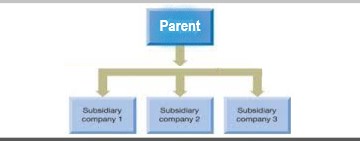
A parent company is a company that has a controlling interest in another company or that owns enough voting stock in another firm to effect control. This can be by way of management or operations by influencing or electing its board of directors. Alternatively, a parent company can be a hands off owner of the subsidiaries. The parent decides how much managerial control is to be given to subsidiary managers. Either way, companies operating under this type of management structure are deemed subsidiaries of the parent.
In mergers and acquisitions, the parent company is almost always the acquirer. The acquirer will effect a merger or takeover with a target company and assume control. The target is often absorbed into the acquirer and may cease to exist although this is not always the case. Size is influential factor as is brand awareness. In a stock swap deal the acquirer may be slightly more difficult to identify. Xerox is smaller than HP (by market capitalization) but has approached HP about a merger. The surviving corporation would be a combination of the two firms both in terms of management and ownership.
Differences with a Holding Company
A holding company is usually an inactive entity used for the purpose of holding other companies. A parent company however, has its own business units in which it has a degree of influence. This can be standalone units or form part of a wider business strategy. Therefore whilst no significant legal differences exist between a parent and a holding company, there are certain implications as to the status of each.
The most significant issue is in accounting methodology. Parent companies use the equity method of accounting for their subsidiaries. They must also provide consolidated financial statements for the entire group into one large set of financial statements.
A Real Life Parent Company Example
The following text is taken from the Form PRER14A Filing with the SEC made by Cincinnati Bell on March 19, 2020 in relation to the proposed takeover by Macquarie Infrastructure Partners V,
VIRTUAL SPECIAL MEETING OF SHAREHOLDERS PROXY STATEMENT
This proxy statement contains information relating to a virtual special meeting (the “special meeting”) of shareholders of Cincinnati Bell Inc., an Ohio corporation (“Cincinnati Bell”, the “Company”, “we”, “us” or “our”). All references to “Parent” refer to Red Fiber Parent LLC, a Delaware limited liability company;
In this document, the parent is clearly identified. The term is used more than 700 times in this document making its definition of upmost importance.
